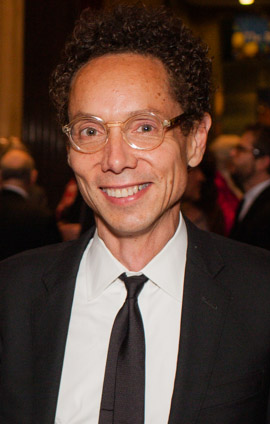PEOPLE are experience rich and theory poor. People who are busy doing things ? as opposed to people who are busy sitting around, like me, reading and having coffee in coffee shops ? don't have opportunities to kind of collect and organize their experiences and make sense of them.

"Malcolm T. Gladwell", Order of Canada/CM is a Canadian journalist, bestselling author, and speaker. He has been a staff writer for The New Yorker since 1996. He has written five books, The Tipping Point: How Little Things Can Make a Big Difference (2000), Blink: The Power of Thinking Without Thinking (book)/Blink: The Power of Thinking Without Thinking (2005), Outliers: The Story of Success (book)/Outliers: The Story of Success (2008), What the Dog Saw: And Other Adventures (2009), a collection of his journalism, and David and Goliath: Underdogs, Misfits, and the Art of Battling Giants (2013). All five books were on The New York Times Best Seller list/The New York Times Best Seller list.
Gladwell's books and articles often deal with the unexpected implications of research in the social sciences and make frequent and extended use of academic work, particularly in the areas of sociology, psychology, and social psychology. Gladwell was appointed to the Order of Canada on June 30, 2011.
If you enjoy these quotes, be sure to check out other famous writers! More Malcolm Gladwell on Wikipedia.We have, as human beings, a storytelling problem. We're a bit too quick to come up with explanations for things we don't really have an explanation for.
We learn by example and by direct experience because there are real limits to the adequacy of verbal instruction.
What do we tell our children? ... Haste makes waste. Look before you leap. Stop and think. Don't judge a book by its cover. We believe that we are always better off gathering as much information as possible and spending as much time as possible in deliberation.
If a window is broken and left unrepaired, people walking by will conclude that no one cares and no one is in charge. Soon, more windows will be broken, and the sense of anarchy will spread from the building to the street on which it faces, sending a signal that anything goes.
The face is not a secondary billboard for our internal feelings. It is an equal partner in the emotional process.
There can be as much value in the blink of an eye as in months of rational analysis.
The single most important thing a city can do is provide a community where interesting, smart people want to live with their families.
That fundamentally undermines your ability to access the best part of your instincts. So my advice to those people would be stop thinking and introspecting so much and do a little more acting.
Truly successful decision making relies on a balance between deliberate and instinctive thinking.
I suspect people who are indecisive are people who are far too enamored of analysis in all settings and are destroying their ability to make an instinctive judgment through over-analysis and that's dangerous.
It made me realize that I'd changed what I thought was a trivial aspect of who I was but it profoundly made a difference in the way the world perceived me. That was when I thought it would be interesting to find out what goes on in that moment when someone looks at you and draws all sorts of conclusions.
It is the new and different that is always most vulnerable to market research.
You can learn as much - or more - from one glance at a private space as you can from hours of exposure to a public face.
If we are to learn to improve the quality of the decisions we make, we need to accept the mysterious nature of our snap judgments.
Instinct is the gift of experience. The first question you have to ask yourself is, 'On what basis am I making a judgment?' ... If you have no experience, then your instincts aren't any good.
It's the boiling point. It's the moment when the line starts to shoot straight upwards.
It is quite possible for people who have never met us and who have spent only twenty minutes thinking about us to come to a better understanding of who we are than people who have known us for years.
Copyright © 2024 Electric Goat Media. All Rights Reserved.